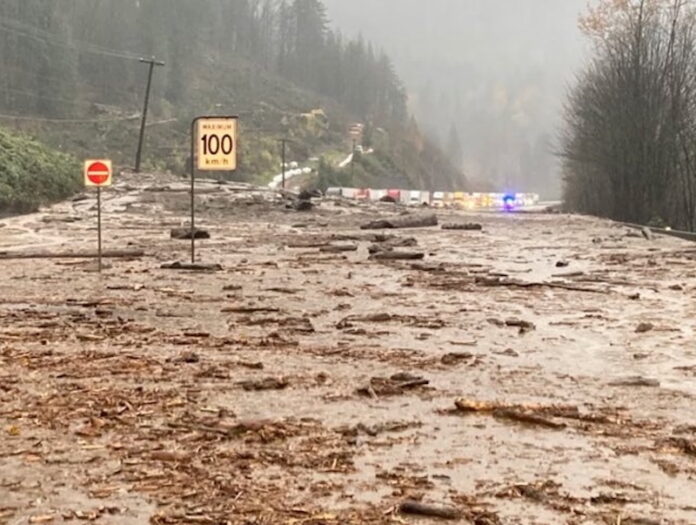A view of a road near Popkum following mudslides and flooding in British Columbia, Canada November 14, 2021. — Courtesy of British Columbia Transportation via Reuters
OTTAWA, Nov 17 — Police said Tuesday at least one person has died in torrential rains that trapped motorists in mudslides, forced thousands to evacuate their homes and cut off Vancouver from the rest of Canada.
Search and rescue teams recovered the body of a woman from a mudslide near Lillooet, 250 kilometers (155 miles) north of Vancouver, the Royal Canadian Mounted Police said.
Staff Sergeant Janelle Shoihet added that investigators have received two missing person reports, but that they believe “there may have been other occupied vehicles that were lost in the slide.”
“The total number of people and vehicles unaccounted for has not been confirmed,” she said.
The rains had let up by late Tuesday afternoon. But mudslides, rocks and debris washed out several highways leading to Vancouver, trapping hundreds of motorists who were rescued by military helicopters by nightfall on Monday.
Local television showed video footage of the Trans Canada highway — which connects the coastal city to the rest of the country — inundated. A bridge was also washed out.
Other routes have also been closed, according to Drive BC, which said on Twitter: “Highways are closed until further notice.”
As a result, motorists wanting to travel to or from Vancouver would have to travel south to the United States and back up into Canada.
Anyone taking this circuitous route, however, would have to show proof of a negative Covid-19 test upon re-entry into Canada.
Landslides also cut off rail traffic to and from Vancouver — one of Canada’s busiest freight sea ports. “Both CN and CP Rail indicate that no rail traffic is currently able to transit between Kamloops and Vancouver,” a port spokesperson told AFP.
In Ottawa, Prime Minister Justin Trudeau said his government is “watching closely” the evolving situation in British Columbia.
He was to speak with the province’s premier, John Horgan, later in the day to see what federal help might be needed.
“We’ll be there to help in any way, shape or form,” he told reporters.
Record rainfall
Environment Canada said up to 250 millimeters (almost 10 inches) of rain — what the region normally gets in a month — fell Sunday and Monday in and around Vancouver, which was also hit last week by a rare tornado.
The extreme weather comes after British Columbia suffered record-high temperatures over the summer that killed more than 500 people, as well as wildfires that destroyed a town.
On Tuesday, thousands of British Columbians were unable to return to their homes due to evacuation orders still in effect due to flooding in a dozen communities — including all of Merritt and parts of Abbotsford — and as many as 9,000 homes were without power.
In Merritt, flooding compromised the wastewater treatment plant, while thousands in Abbotsford reportedly slept in their cars on an elevated road overnight, as farms in the Fraser Valley were inundated.
Others took shelter at emergency sites set up across the province, with some also sleeping in church pews or at schools, local media said.
“Everyone’s been very good-humored,” Andrew Clark, a musician stuck with a thousand other travelers in Hope, 150 kilometers (90 miles) east of Vancouver, told public broadcaster CBC.
“Everyone knows that we are in the same boat, so that’s all quite good, but I think there’s a sort of general air of disappointment that we can’t find out more information about what’s happening down the road,” he said.
“People are a little bit worried about how many nights we might be staying here.” — AFP


